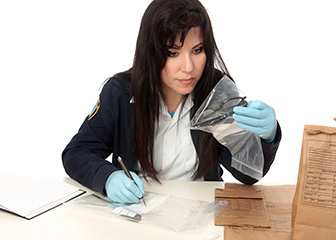How to Become a Private Detective or Investigator About this section

Although most of the work of private detectives and investigators is learned on the job, many people entering this field have a law enforcement background.
Private detectives and investigators usually have some college education. However, many jobs do not have formal education requirements and private detectives and investigators learn on the job. Previous experience in investigative work can be beneficial. Private detectives and investigators need a license in most states.
Important Qualities
Communication skills. Detectives and investigators must be able to listen carefully and ask appropriate questions when interviewing a person of interest.
Honesty. Detectives and investigators must tell the truth to gain the trust of their clients and people they interview, as well as to establish credibility in a court of law.
Inquisitiveness. Private detectives and investigators must want to ask questions and to search for the truth.
Problem-solving skills. Detectives and investigators must be able to think on their feet and make quick decisions based on the information that they have at a given time.
Resourcefulness. Detectives and investigators must work persistently with whatever leads they have, no matter how limited, to determine the next step toward their goal. They sometimes need to figure out what a person of interest will do next.
Education and Training
Most private detectives and investigators learn on the job.
Although new investigators must learn how to gather information, additional training depends on the type of firm that hires them. For instance, at an insurance company, a new investigator will learn to recognize insurance fraud. Learning by doing, in which new investigators are put on cases and gain skills as they go, is a common approach. Corporate investigators hired by large companies, however, may receive formal training in business practices, management structure, and various finance-related topics.
Private detectives and investigators usually have some college education. Although some investigation jobs may not have specific education requirements, others require candidates to have a high school diploma.
Some jobs may require an associate’s or bachelor’s degree. Postsecondary courses in criminal justice and political science are helpful to aspiring private detectives and investigators.
Although previous work experience is generally required, some people enter the occupation directly after graduating from college with an associate’s degree or bachelor’s degree in criminal justice or police science.
Corporate investigators typically need a bachelor’s degree. Coursework in finance, accounting, and business is often preferred. Because many financial investigators have an accountant’s background, they typically have a bachelor’s degree in accounting or a related field.
Many computer forensics investigators need a bachelor’s degree in a related field, such as computer science or criminal justice. Many colleges and universities now offer certificate programs in computer forensics, and others offer a bachelor’s or a master’s degree. Because computer forensics specialists need both computer skills and investigative skills, extensive training may be required.
Many computer forensic investigators learn their trade while working for a law enforcement agency, where they are taught how to gather evidence and to spot computer-related crimes. Many people enter law enforcement to get this training and to establish a reputation before moving on to the private sector.
Because they work with changing technologies, computer forensic investigators never stop training. They must learn the latest methods of fraud detection and new software programs and operating systems by attending conferences and courses offered by software vendors and professional associations.
Work Experience
Private detectives and investigators typically have previous work experience. Some have worked for insurance or collections companies, as paralegals, in finance, or in accounting. Many investigators enter the field after serving in law enforcement, the military, or federal intelligence jobs. These people, who frequently are able to retire after 25 years of service, often become private detectives or investigators as a second career.
Licenses
Most states license private detectives and investigators. However, requirements vary by state. Some states have few requirements, and many others have stringent regulations.
In most states, detectives and investigators who carry handguns must meet additional requirements. Some states require an additional license to work as a bodyguard.
Because laws change, jobseekers should verify the licensing laws related to private investigators with the state and locality in which they want to work.
There are no licenses specifically for computer forensic investigators, but some states require them to be licensed private investigators. Even in states or localities where licensure is not required, having a private investigator license is useful, because it allows computer forensic investigators to do follow-up and related investigative work.
Certification
Some private detectives and investigators can get certification from a professional organization to demonstrate competency, which may help them to advance their careers. For investigators who specialize in negligence or criminal defense investigation, the National Association of Legal Investigators offers the Certified Legal Investigator certification. For investigators who specialize in security, ASIS International offers the Professional Certified Investigator certification.
Advancement
Most private detective agencies are small, with little room for advancement. Usually, there are no defined ranks or steps, so advancement takes the form of increases in salary and better assignments. Many detectives and investigators start their own firms after gaining a few years of experience. Corporate and legal investigators may rise to supervisor or manager of the security or investigations department.











